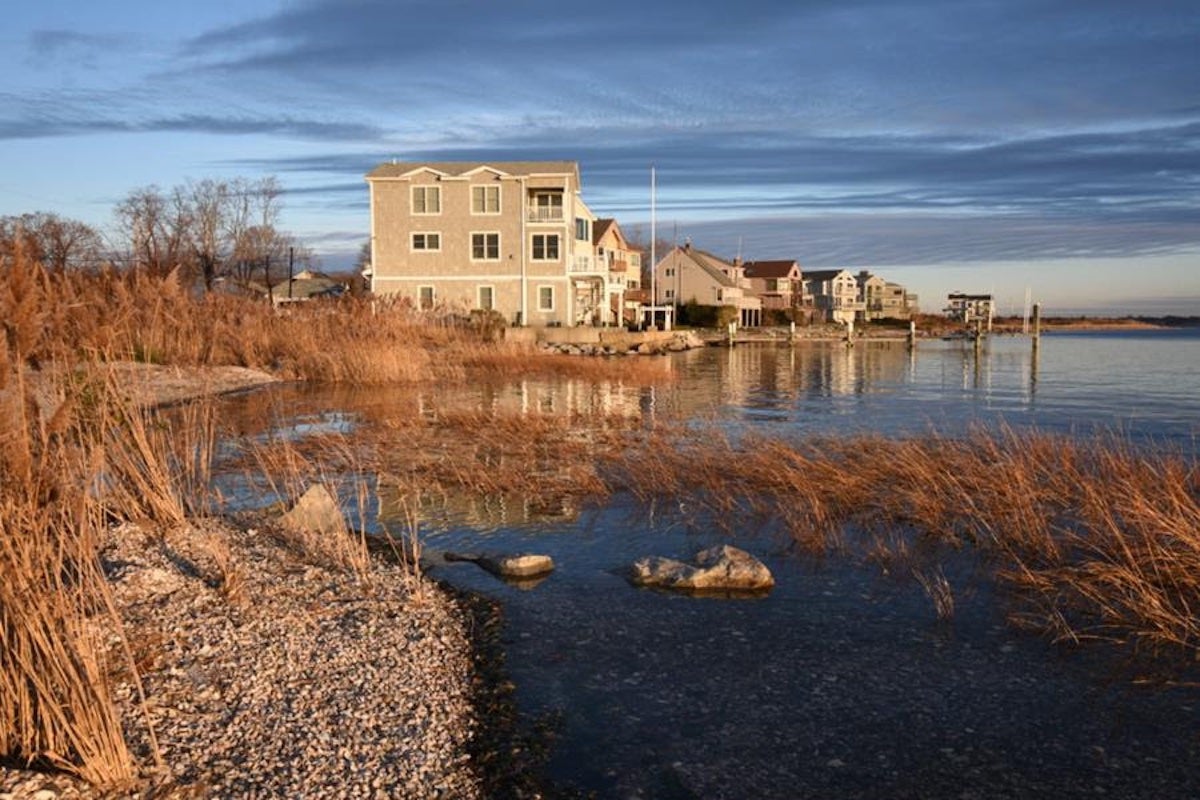$6 million NSF grant brings together 6 academic, research institutions to establish a health, research hub for New England coast
August 9, 2023
University of Rhode Island researchers Austin Becker, J.P. Walsh, Christopher Damon and Pam Rubinoff are among 21 scientists who will help develop a coastal resilience hub for New England.
As part of a $6 million National Science Foundation grant, the five-year project will bring together researchers from Brown University, URI, Rhode Island College, the University of New Hampshire, Gulf of Maine Research Institute and the Northeastern Regional Association of Coastal Ocean Observing Systems. Emanuele Di Lorenzo, a professor in Brown’s Department of Earth, Environment and Planetary Sciences, will lead the project. Sarah Lummins, a researcher at the Institute at Brown for Environment and Society, is executive director of the new hub. The grant funding begins in September.
Becker, associate professor and chair of URI’s marine affairs program, is a co-principal investigator on the project.
Called “Community-Driven Coastal Climate Research and Solutions (3CRS) for the Resilience of New England Coastal Populations,” the project will focus on the ports of Providence and Galilee and ports in Rockland and Bath, Maine. Eventually, the team expects to bring the knowledge and tools gained from working with these waterfronts to the entire New England coast and beyond.
The need for action is pressing, as the National Oceanic and Atmospheric Administration says coastal communities across the U.S. continue to experience frequent high-tide flooding, forcing residents, businesses and visitors to contend with flooded shorelines, streets and basements. NOAA says that regional locations such as the Northeast Atlantic may continue to see increased flooding. The agency said that by 2050, high-tide flooding on a national scale is expected to occur between 45 and 70 days per year.
“We will work directly with communities and their decision-makers to help them with resilience planning, investigate the science needs and develop those analyses, tools and modeling instruments that can be delivered back to those communities. Major pieces of this work are going to be communications, storylines, and tools that are useful for communities,” Becker said.
“We are looking at bridging the gap between scientific research output and community decision-maker needs,” Becker said. “The project will make science accessible to assist communities facing these major challenges.”
The University of Rhode Island brings “a deep bench of resilience specialists, tools and partnerships, including its Department of Marine Affairs, Coastal Resources Center and Environmental Data Center,” said Rubinoff, an associate coastal manager and extension specialist for coastal resilience and Rhode Island Sea Grant at the URI Graduate School of Oceanography.
The University is also a major partner with the Department of Homeland Security’s Coastal Resilience Center of Excellence Projects at the University of North Carolina at Chapel Hill.
The new grant, which was announced Monday, will fund expansion of the Coastal Hazards Analysis, Modeling and Prediction (CHAMP) system, currently in use in Rhode Island, to other New England coastal states. The CHAMP system, developed by GSO oceanographer Isaac Ginis with a team of colleagues and students at URI, links high-resolution storm modeling with on-the-ground impacts and consequences, resulting in a dashboard tool that helps end-users understand resilience challenges. It will support collaboration with other institutions to develop and provide services for working waterfronts and URI’s efforts to build the next generation of coastal scientists and practitioners skilled in major areas of resilience planning and practice.
Becker is the leader of the community knowledge collective task and modeling coastal impacts task.
Other key portions of the program address research impact in affected populations, interjurisdictional collaborations and partnerships, sustainability of the team, workforce development, evaluation and assessment, and management and implementation.
“One of the central areas of work will be on the health and well-being of communities, and what kinds of impacts climate change is going to have on these communities,” URI’s Becker said.
“We are going to monitor changes, work on modeling to predict what might happen, and tie those predictions to heat and storms, among others, and their consequences. What are the consequences around, for instance, increasing temperatures, the impacts on hospitals so they can prepare themselves in advance? We will develop products and resources people can use to aid decision making,” Becker said.
“We are really excited to be working with Professor DiLorenzo, and this entire group to expand what we have done. He did a phenomenal job in bringing this research team together,” Becker said.”
Walsh, professor of oceanography at the Graduate School of Oceanography and director of the Coastal Resources Center, who specializes in coastal processes and hazards, said his role with the project is assisting with the monitoring and modeling efforts for climate-related risks including coastal disasters.
Rubinoff said URI has been involved deeply in capacity building, planning, and technical assistance for at least two decades, including through storm modeling, development of decision-support tools, applied science, and Sea Grant Extension to build resilience in our coastal communities.
“We’ve done this internationally, and it will be exciting for us to work with a new team at Brown, and other universities and agencies in the Northeast,” Rubinoff said.

